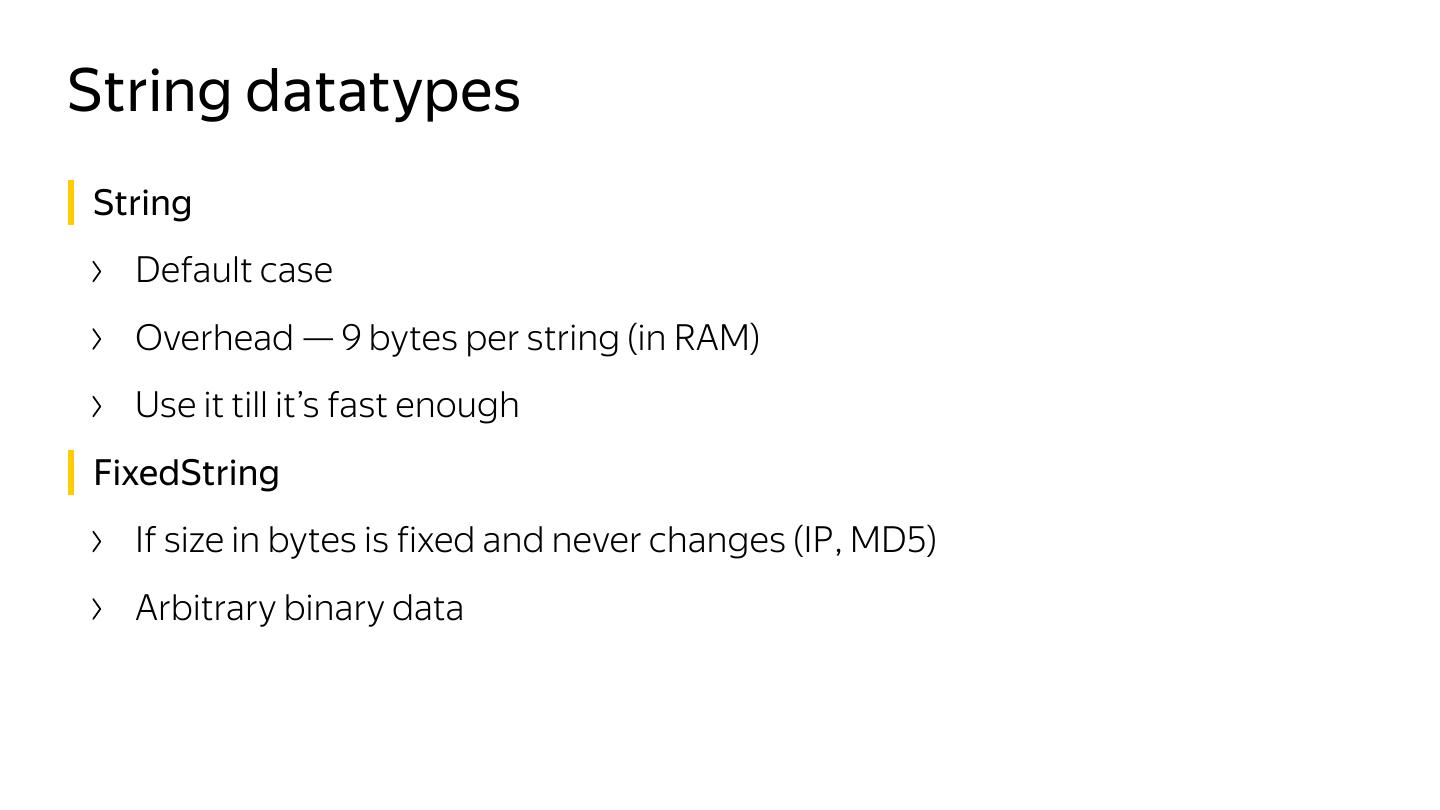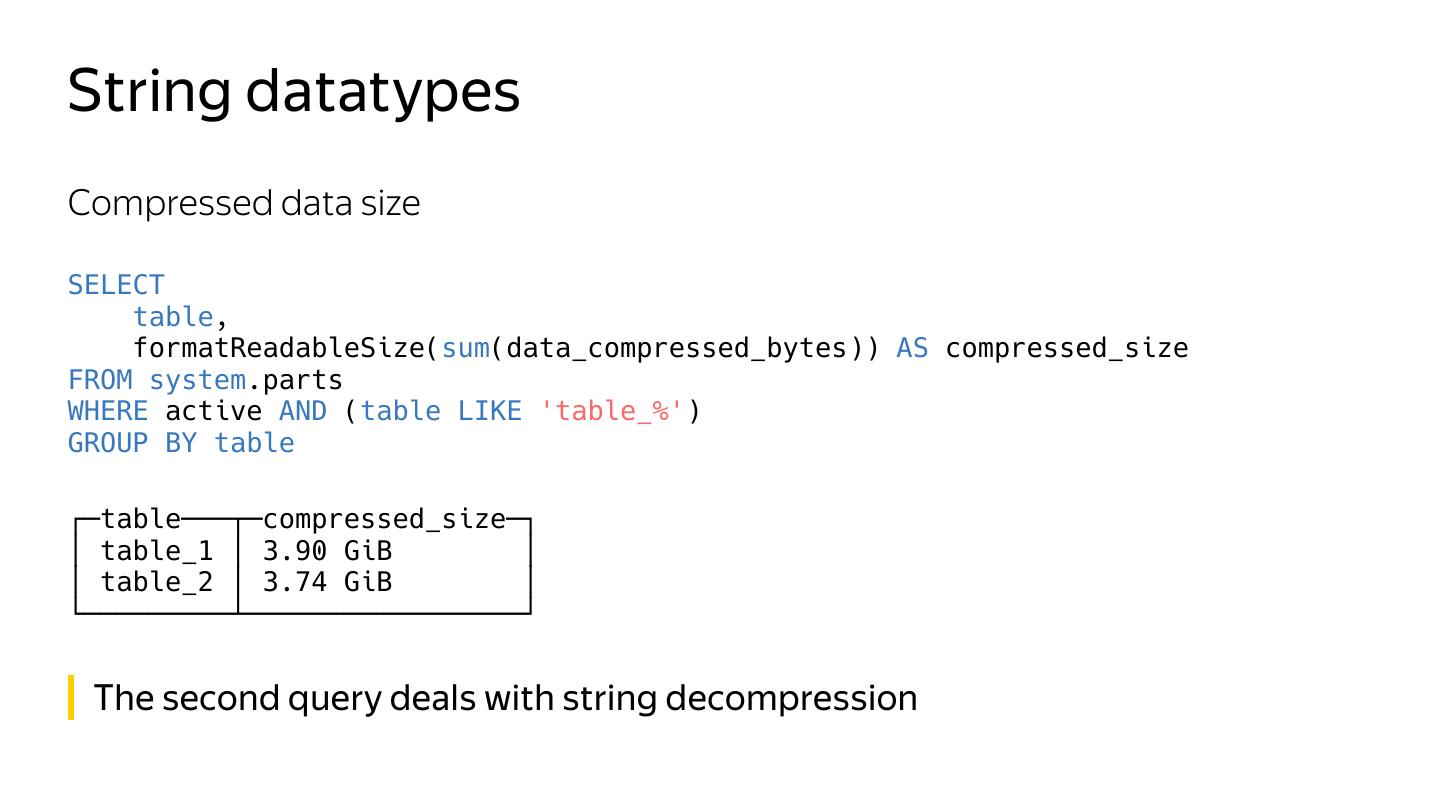- 快召唤伙伴们来围观吧
- 微博 QQ QQ空间 贴吧
- 文档嵌入链接
- 复制
- 微信扫一扫分享
- 已成功复制到剪贴板
String optimization in ClickHouse
- Clickhouse中的字符串存储
- 字典编码字符串
- 性能估计
总结:
LowCardinality类型在上一个版本的Experimental中可用(设置allow_experimental_low_cardinality_type=1以启用)
对数据集的测试性能只需将字符串替换为StringWithDictionary目标,就可以使具有Dictionary的数据类型在所有情况下都优于String隐式将字符串替换为带字典的字符串
展开查看详情
1 .
2 .String optimization in ClickHouse Nikolai Kochetov ClickHouse developer
3 .String storage in ClickHouse
4 .String datatypes String Default case Overhead — 9 bytes per string (in RAM) Use it till it’s fast enough FixedString If size in bytes is fixed and never changes (IP, MD5) Arbitrary binary data
5 .String datatypes Queries from tables with the same data. SELECT sum(ignore(val)) FROM table_1 Processed 1.00 billion rows, 4.00 GB (1.86 billion rows/s., 7.46 GB/s.) SELECT sum(ignore(val)) FROM table_2 Processed 1.00 billion rows, 17.89 GB (683.57 million rows/s., 12.23 GB/s.) Tables store first billion numbers into UInt64 and String types
6 .String datatypes Compressed data size SELECT table, formatReadableSize(sum(data_compressed_bytes)) AS compressed_size FROM system.parts WHERE active AND (table LIKE 'table_%') GROUP BY table ┌─table───┬─compressed_size─┐ │ table_1 │ 3.90 GiB │ │ table_2 │ 3.74 GiB │ └─────────┴─────────────────┘ The second query deals with string decompression
7 .Low granularity strings Enum8, Enum16 Set of strings is known beforehand Set of strings (almost) never changes Advantages Storage and processing numeric data Cheap GROUP BY, IN, DISTINCT, ORDER BY optimized for individual cases (e.g. comparison with constant string) Disadvantages Altering the datatype
8 .ALTER Enum Why can it be slow? Enum structure is stored into a table scheme Wait for selects to be able to change structure Can we do better? Store Enum structure somewhere else (ZooKeeper) Do not wait for selects just in this case Possible problems Synchronization Fetching a part with new data from another replica
9 .External dictionaries Store strings in a dictionary, indices in a table Advantages Dynamically changeable set of strings No alterations (no problems) A variety of dictionary sources Disadvantages Bulky (explicit) syntax Difficult to optimize Delayed updates from external source
10 .Local dictionaries Getting rid of global dictionaries No synchronization — no problem Store dictionaries locally Per block (in memory) Per part (on file system) In caches (during query processing)
11 .Dictionary encoded strings
12 .StringWithDictionary Datatype for dictionary encoded strings Serialization Representation in memory Data processing Content: Dictionary Column with positions Reversed index
13 .LowCardinality(Type) Is a general datatype with dictionary encoding Is implemented for strings, numbers, Date, DateTime, Nullable. StringWithDictionary is an alias for LowCardinality(String). Remains for some functions SELECT toLowCardinality('') AS s, toTypeName(s), toTypeName(length(s)) ┌─s─┬─toTypeName(toLowCardinality(''))─┬─toTypeName(length(toLowCardinality('')))─┐ │ │ LowCardinality(String) │ LowCardinality(UInt64) │ └───┴──────────────────────────────────┴──────────────────────────────────────────┘
14 .Queries optimizations Implemented Positions Positions Functions executed on dictionaries 2 2 if it’s possible Dictionary 4 Dictionary 4 Calculations are cached for same iPhone 1 6 1 dictionaries Galaxy A3 1 9 1 length() GROUP BY optimization Redmi Note 3 3 12 3 To be done Lenovo A2010-a 4 14 4 2 2 Specializations for aggregate functions 1 1
15 .High cardinality strings What if we insert a lot of different iPhone 2 0 strings? Galaxy A3 1 Lenovo A2010-a 1 Serialization limit: 1 3 low_cardinality_max_dictionary_size 2 Store excessive keys locally 1 2 Galaxy A3 1 Fall back to ordinary column Redmi Note 3 2 (in plans) iPhone 3 3 2 2 1 4
16 .Storage volume Can we decrease it? Column COUNT DISTINCT String Dictionary Enum CodePage 62 72.18 MiB 26.97 MiB 26.20 MiB PhoneModel 48044 439.20 MiB 440.61 MiB - URL 137103569 13.15 GiB 11.28 GiB - lz4, zstd use dictionary encoding
17 .Performance estimation
18 .TLC trip record dataset Dataset with NYC taxi and Uber trip data https://github.com/toddwschneider/nyc-taxi-data More than 1.1 billion trips from January 2009 to July 2015 Start and end time of the trip Location names Payment type The number of passengers Taxi type (yellow taxi, green taxi, Uber)
19 .TLC trip record dataset What is the most popular pickup place? SELECT pickup_ntaname FROM trips GROUP BY pickup_ntaname ORDER BY count() DESC ┌─pickup_ntaname─────────────────────────────┬─count()───────────────────┐ │ Midtown-Midtown South │ ████████████████████████▋ │ │ Hudson Yards-Chelsea-Flatiron-Union Square │ █████████████▋ │ │ West Village │ ██████████▌ │ │ Upper East Side-Carnegie Hill │ ██████████▎ │ │ Turtle Bay-East Midtown │ █████████▊ │ │ SoHo-TriBeCa-Civic Center-Little Italy │ ███████▍ │ │ Upper West Side │ ███████ │ │ Murray Hill-Kips Bay │ ██████▋ │ │ Clinton │ ██████▏ │ │ Lenox Hill-Roosevelt Island │ █████▊ │ └────────────────────────────────────────────┴───────────────────────────┘
20 .TLC trip record dataset Store pickup locations into 3 different types: String StringWithDictionary Enum16 Query String Dictionary Enum16 Most popular location 4.890 sec. 0.548 sec. 0.783 sec.
21 .TLC trip record dataset Where is the most popular park? SELECT pickup_ntaname FROM trips WHERE lower(pickup_ntaname) like '%park%' GROUP BY pickup_ntaname ORDER BY count() DESC ┌─pickup_ntaname────────────────────┐ │ Battery Park City-Lower Manhattan │ │ park-cemetery-etc-Manhattan │ │ Park Slope-Gowanus │ │ park-cemetery-etc-Queens │ │ Rego Park │ │ Sunset Park West │ │ park-cemetery-etc-Brooklyn │ │ Baisley Park │ │ Bedford Park-Fordham North │ └───────────────────────────────────┘
22 .TLC trip record dataset Query String Dictionary Enum16 Most popular location 4.890 sec. 0.548 sec. 0.783 sec. Most popular park 3.934 sec. 0.440 sec. 4.776 sec. Why is query with Enum is slow? LIKE is not optimized for Enum Enum is converted to string Enum needs manual optimization in code
23 .TLC trip record dataset The number of different locations. SELECT uniq(pickup_ntaname) FROM trips ┌─uniq(pickup_ntaname)─┐ │ 196 │ └──────────────────────┘ The number of different locations in Manhattan SELECT uniq(pickup_ntaname) FROM trips where pickup_boroname='Manhattan' ┌─uniq(pickup_ntaname)─┐ │ 29 │ └──────────────────────┘
24 .TLC trip record dataset Query String Dictionary Enum16 Most popular location 4.890 sec. 0.548 sec. 0.783 sec. Most popular park 3.934 sec. 0.440 sec. 4.776 sec. Unique locations 4.136 sec. 3.432 sec. 1.050 sec. Unique locations in Manhattan 5.425 sec. 3.497 sec. 1.328 sec. Why is the last query is two times faster for StringWithDictionary? StringWithDictionary filtration works only for indices
25 .TLC trip record dataset Slow function example SELECT hex(SHA256(pickup_ntaname)) AS hash, count() FROM trips_dict GROUP BY hash ORDER BY count() DESC ┌─hash─────────────────────────────────────────────────────────────┬───count()─┐ │ 924AAA8D24075B327D16A53E39EE56FFA33AD8A3FE822F647A7E3765CD754DCA │ 207582585 │ │ B1E4D0E42D25F1341D9AA327CD59838B29F31D09CC34C9A25287679DD19359B2 │ 114945944 │ │ EBA433E6A9487BD2030D4623D86330B8C89C60319E410FBE035450D63CD92652 │ 88277252 │ │ E4EEEEA4D816773D94F09BE59144EC1EE7B65052B040689606237D3F8EE18344 │ 86192276 │ │ 9E74963DCB63099B44C7AD5B132F9144D80C6A4E1776B2DFB0B502A1CB5E853D │ 83692525 │ │ FB19C1C65FE9F2490C4D9AE45FD40679375CB26F289075420C33C8C4A318C046 │ 62524265 │ └──────────────────────────────────────────────────────────────────┴───────────┘
26 .TLC trip record dataset Query String Dictionary Enum16 Most popular location 4.890 sec. 0.548 sec. 0.783 sec. Most popular park 3.934 sec. 0.440 sec. 4.776 sec. Unique locations 4.136 sec. 3.432 sec. 1.050 sec. Unique locations in Manhattan 5.425 sec. 3.497 sec. 1.328 sec. Slow function 31.566 sec. 2.440 sec. 32.608 sec.
27 .Summary LowCardinality type is available in last release Experimental ( set allow_experimental_low_cardinality_type = 1 to enable) Test performance on your dataset Just replace String with StringWithDictionary Goals Make datatype with dictionary better than String in all cases Implicitly replace String with StringWithDictionary
































